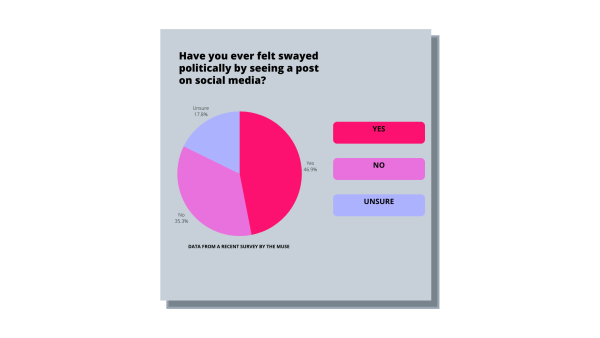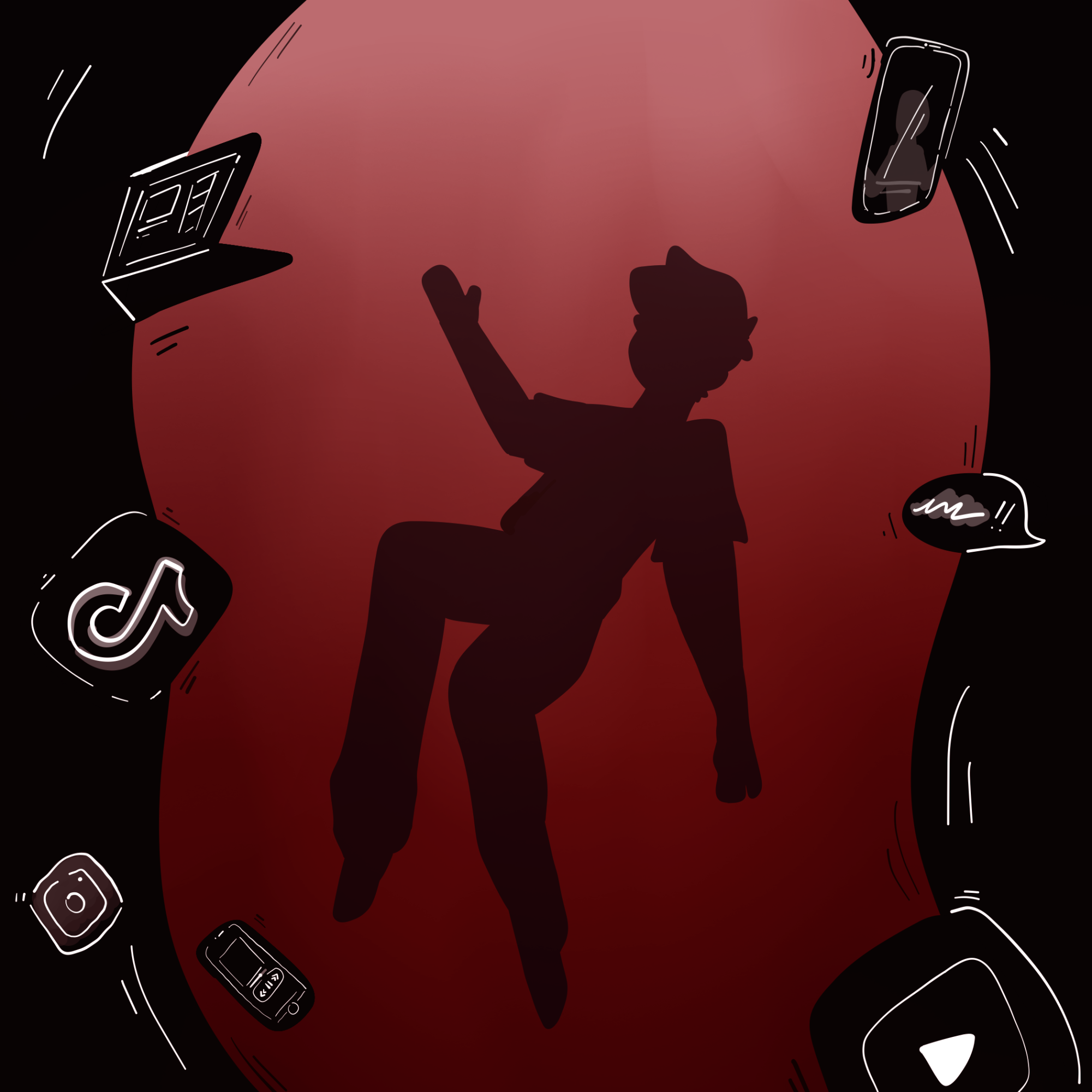Strings sophomore Julia Moyongo says that TikTok is the main way she receives her news. And she’s not the only one.
According to a 2020-2023 survey of U.S. citizens by Pew Research Center, the amount of TikTok users who say they “regularly” receive their news from the platform has increased from 22% to 43%, the biggest increase of any social media site they asked about. According to Statistica, approximately 70% of U.S. teens use TikTok monthly.
“I’ve done my research and things on TikTok are generally very accurate, a lot more than if you search on Google,” Moyongo said. “It’s not always right when the news articles are writing about it, but I think people on TikTok care more than those big newspapers.”
Moyongo says she has been able to filter out her social media to include mostly unbiased sources. Still, a recent survey by The Muse* shows that 80.3% of students have seen an online post or a website that includes content presenting stereotypes toward specific races, ethnicities, genders, or sexualities. In a study by Frontiers in which researchers presented high school students with fake and real news, 40% of students could not tell the difference.
“It’s very easy to get radicalized in today’s age with information,” Carey said. “He who controls information controls the entire world, so it’s very important to find your news from a very reputable source.”
What Carey refers to when he describes getting “radicalized” is the phenomenon known as the “alt-right pipeline.” The alt-right pipeline is a theoretical model detailing how a person might see internet content through any website or social media platform that holds increasingly more discriminatory beliefs. Eventually, this person may end up becoming part of the “alt-right”, a group that is mainly known for believing in the superiority of the white race.
“I used to have more drastic opinions, and I have to entitle that mostly to social media,” junior Elijah Carrington** said. “The algorithm does nothing but worsen these effects. And not just me, but many, many, many others who have a phone and who have social media, their views are being impacted.”
Once a user begins to view certain content, the algorithms driving these platforms will put similar content on their feed in order to generate more interaction with the app or website. This creates echo chambers, defined by Proceedings of the National Academy of Sciences of the United States of America as “environments in which the opinion, political leaning, or belief of users about a topic gets reinforced due to repeated interactions with peers or sources having similar tendencies and attitudes.” According to The Muse’s survey, 14.4% of students said they have experienced the alt-right pipeline themselves.
“It was a very quick, steep hill of just seeing one article that led to the next one and the next and the next,” Carrington said. “Before you know it, your whole feed or page is just entirely different than what you believed in last week.”
Dowling said that he has personally experienced this pipeline. He described the videos that started his journey down the pipeline as having a “comedic aspect.” Often, the videos he watched on YouTube would center around the premise of “owning a social justice warrior.” In these videos, the content creator would debate liberals and “embarrass” them for comedic purposes. But after he saw those videos, the YouTube algorithm began to recommend videos that he described as “edgy.”
“You’re slowly getting pulled into this rabbit hole of being influenced to go to the next step,” Dowling said. “Eventually, you’ll find yourself lumped in with extreme fascism.”
One person that Dowling credits for the current version of the alt-right pipeline is Andrew Tate — a social media personality known for sharing his personal views on how men should act as the superior gender, leading news sources like CNN and The Guardian to label him as a misogynist. Dowling compares him to the personalities of figures like Ben Shapiro or Steven Crowder, conservative influencers he says were more popular from 2016 through 2018, when he experienced the alt-right pipeline. He says these figures do not necessarily promote alt-right ideas, but they may lead to someone “being gravitated” toward those ideas.
“I think a lot of people will listen to just one person, for example, Andrew Tate,” Carey said. “I know that a lot of men my age are going to say that he’s a good role model, and yeah, he’s got some good takes, but some of them are very damaging to certain populations, especially women.”
According to a study by Harvard University, engaging in sexist behavior on the internet increases levels of sexism in everyday life. This can contribute to personal disagreements, including conflicts with demographics that internet users have seen negative content toward. According to Western University, online misogyny has a variety of negative effects on women, including emotional distress.
“I’ve had friends who have taken sides in feminist arguments against progressing the rights of girls today due to their newfound love of viewing men’s podcasts,” visual junior Ameera Spence said. “I think that it’s important to accept that not everyone will have the same views that you do, but when it becomes an argument of human rights versus personal opinion, that’s when the real issue with the influence of social media on students should be addressed.”
Seeing content from alt-right or conservative influencers is not the only reason that students say they have changed their political views. The 32.2% of students who identify as liberal (compared to the 7% of students who said they were conservative and 19.7% of students who said they were moderate, according to The Muse’s survey) on campus may push students to go to the other extreme. Junior Cole Barlow** said that the social media posts from the liberal population at our school (referring to them as “libtards”) pushed him to become more right-leaning.
“Everyone (at our school) believes all of the fake s— in the media,” Barlow said. “Everything’s so blown out of proportion.”
Conservatives, specifically young men, can become alienated and pushed to the alt-right because they disagree with certain ideas promoted by the left. According to a survey by the Public Religion Research Institute, half of American men and 30% of American women now think that society “punishes men for acting like men.”
“There’s just something about appealing to a young male audience,” Dowling said. “I feel as though young males particularly are in this phase before they become a teenager or as they’re becoming a teenager, that they’re trying to figure themselves out. When they’re figuring themselves out, they take things (information) without really thinking. I think that’s the main issue. There’s this stigma with men that they need to be manly, and that manly concept can be shifted and contorted in ways to promote dangerous opinions. It happens a lot across the internet.”
According to The Muse’s survey, 46.5% of students reported that they feel they have been swayed politically by seeing a social media post. 46.8% of students also said that social media has at some point changed their perspective on certain racial, ethnic, gender, or sexuality groups. These perspectives don’t just skew to the right — Dowling believes that in general, students can feel forced to develop extreme views because of social media.

“It’s the idea of groupthink, where you involve yourself in this group of people, but they don’t recognize that you’re allowed to differ in viewpoints and be different than another person in your political realm,” Dowling said. “Even if you have a certain viewpoint that’s like, ‘Hey, I’m a liberal, but I’m against communism,’ there’s this stigma that if you are (politically) left and you’re against communism, then you’re a fascist. You get lumped in with the right wing, even though you’re politically left wing. That leads other people in your political sphere to be like, ‘Okay, we need to approve of communism, or else we’re out. We (seem like we) are a fascist.’”
Carey also stated that he felt pressured to share the same viewpoints as others on social media and to hide his own opinions on current events, specifically on the Israel-Hamas conflict. He feels that the pressure to “react” to events in the same way as others on social media has affected him.
“I’ve been ostracized for my views,” Carey said. “I’m very pro-Israel because I have a lot of connections in Israel, and it’s part of my ancestral homeland. But I’ve been ostracized for that. I feel like a lot of people on the other side of it are ostracized too, and I don’t think that’s right either. I think that both sides have a right to be heard.”
What Moyongo, Carey, and Dowling all agreed on is that social media can influence students by causing division. According to the Pew Research Center, 64% of Americans feel that social media negatively impacts current events in America. Because of the echo chamber effect showing people content that mainly affirms their beliefs, Moyongo said that when people see content that they disagree with, arguments often ensue.
“People will always try to find a way to say that you’re wrong,” Moyongo said. “You don’t always have to point out when someone’s wrong or when someone’s right. You just have to be nice about it. Personally, it didn’t affect me in such a way, but somebody who isn’t as emotionally strong can take it the wrong way and feel attacked and maybe a little bit lonely just because they think or feel a certain way on social media politically.”
Studies from Proceedings of the National Academy of Sciences of the United States of America show that people are less likely to fact-check sources that already support their current view, leading them to become misinformed. However, Dowling, who has since changed his own political views, says that there are ways to avoid basing opinions around what is on social media.
“I think to pull yourself out of the pipeline, you need to recognize the situation that you’re in,” Dowling said. “You need to look at the people around you that care about you and that you care about. Recognize that these are all individual people with their own lives. They have the right to do as they please and you aren’t one to judge someone for the way they feel and the way they act. You shouldn’t be influenced by someone on the internet saying (you should) hate a certain group of people. I think that fundamentally changed my perspective.”
*The data included was gathered from a casual survey from The Muse that was given through a Google Form via English classes Jan. 23 and 24 to 862 students.
**These are fake names, listed without students’ art majors. These names were generated to protect the anonymity of sources.





